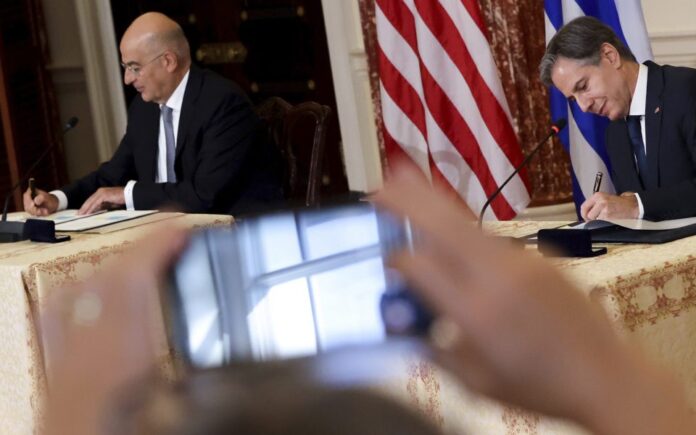“The supreme art of war is to subdue the enemy without fighting.” Sun Tzu (544-496 BC)
By Demetries Grimes
The US acknowledgment of respect for Greece’s sovereign rights under the International Law of the Sea and rewarding Greece, a steadfast ally, for its ability to play an even greater role in promoting peace and stability in the region and beyond was long overdue. The renewed defense pact between the United States and Greece signed last week in Washington, DC by US Secretary of State Antony Blinken and Greek Foreign Minister Nikos Dendias is a significant achievement.
The agreement reinforces the importance of the strategic partnership and bond between the United States and Greece – an enduring partnership and special bond that dates to America’s Founding Fathers’ inspiration by the ideals of ancient Greek democracy and the inspiration that Greece’s War of Independence leaders drew from America’s defeat of the world’s greatest superpower at the time of its revolutionary war, Great Britain.
Positioned at the frontier of Europe and surrounded by an arc of instability that extends from the Balkans, in the north, to Turkey, Syria, Lebanon and Gaza in the east, and Egypt, Libya, Tunisia and beyond to the south, Greece has faced greater challenges than any of its fellow European Union and North Atlantic Treaty Organization partners.
From enduring an extended financial crisis, weaponized migrant flows from the east, leading the EU in implementing responsible measures to reopen its economy during a global pandemic, and continuous aggression and violations of its sovereignty by Turkey, a NATO ally, that behaves as an adversary, but with access to NATO secrets, codes and operational plans – Greece, also respected by Balkan, Middle Eastern and North African partners, continues to maintain the moral high ground and conducts itself with honor in fulfilling its NATO commitments, promoting the rule of law, and respecting the protocols of the international order of sovereign states that distinguish responsible nations from rogue nations.
By extending the once annually reviewed Mutual Defense Cooperation Agreement (MDCA) to a five-year agreement to be followed by indefinite extension unless one party chooses to withdraw, leaders in Washington and Athens acknowledged what military commanders and diplomats have known for years, that Greece is a steadfast ally with an unbreakable and unshakable bond rooted in its pursuit of the righteous ideals of representative democracy, human dignity and the rule of law.
The extended MDCA removes barriers that have for decades obstructed greater US investment in mutually beneficial defense infrastructure and cooperation. The US Congress and bureaucrats in Washington restricted budget allocations to the bare minimum required to sustain current operations and military cooperation as the MDCA was characterized as a “temporary” agreement.
Greece’s borders with Turkey are the EU and the West’s borders with the east. Authoritarianism is now rooted in and on the rise in more than 50 nations from Istanbul to Moscow, to Kinshasa, to Damascus, to Baku, to Tehran, to Naypyidaw, to Beijing, to Hong Kong, to Pyongyang, to Havana, to Caracas. While there is much to celebrate for this significant achievement, the renewed defense pact between the United States and Greece must be treated as a “cornerstone” to be built upon further and not a “capstone” as there is much more work to be done, to include reining in a rogue ally in the east with dark and dangerous ambitions.
Commander Demetries Grimes is a combat decorated former US naval officer, aviator, diplomat and Afghanistan war veteran. He has served as naval-attache to Israel and Greece, deputy commander of the US base on Crete, and adviser to NATO’s maritime commander in London, UK. / info: kathimerini














